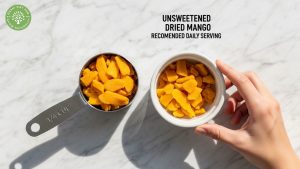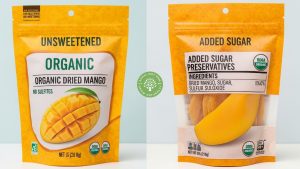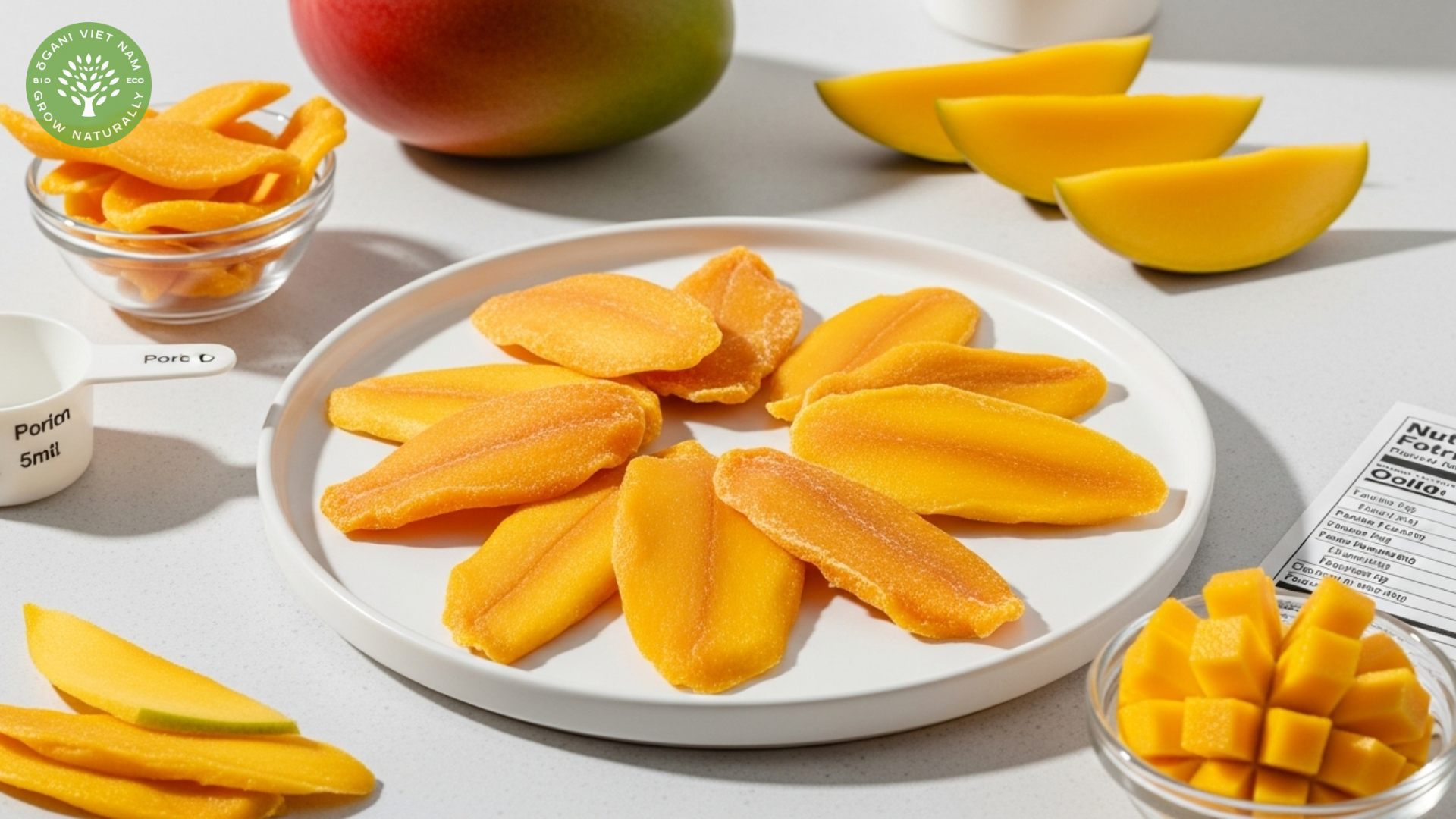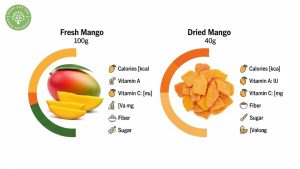Is unsweetened dried mango healthy? Yes, unsweetened dried mango can be a nutritious snack option when consumed in moderation. It retains many vitamins and minerals from fresh mango while providing concentrated fiber and natural energy – though the sugar content remains significant even without added sweeteners.
Nutritional profile of unsweetened dried mango
Unsweetened dried mango delivers impressive nutritional density in a compact form. A typical serving of four pieces (about 40g) contains approximately 130-140 calories, with most coming from natural fruit sugars and carbohydrates.
The vitamin content stands out as particularly noteworthy. Unsweetened dried mango provides substantial amounts of vitamin A, essential for eye health and immune function, plus vitamin C for collagen synthesis and antioxidant protection. The concentration process actually increases the vitamin A content per serving compared to fresh mango.
Key minerals include potassium for heart health and muscle function, along with smaller amounts of calcium and iron. The dietary fiber content, though reduced from fresh fruit, still contributes to digestive health and helps slow sugar absorption.
| Nutrient | Per 40g serving | % Daily Value |
|---|---|---|
| Calories | 130-140 | 6-7% |
| Vitamin A | 1,260 IU | 25% |
| Vitamin C | 29mg | 32% |
| Dietary Fiber | 2g | 8% |
| Potassium | 325mg | 7% |
| Natural Sugars | 28-32g | – |
Health benefits and antioxidant properties
The antioxidant profile of dried mango includes beta-carotene, vitamin C, and phenolic compounds that combat oxidative stress in the body. These antioxidants support immune system function and may help reduce inflammation markers when consumed as part of a balanced diet.
Digestive health support
The fiber content in unsweetened dried mango promotes healthy digestion by supporting beneficial gut bacteria and adding bulk to stool. While the fiber concentration is lower than fresh mango due to water removal, it still provides meaningful digestive benefits.
Energy and metabolism benefits
The natural fruit sugars provide quick energy for physical activities or mental focus. The combination of simple and complex carbohydrates offers both immediate and sustained energy release, making it useful for pre-workout nutrition or afternoon energy dips.
Immune system support
Vitamin C and vitamin A work synergistically to maintain immune function. Vitamin A supports the integrity of mucous membranes – your body’s first line of defense against pathogens – while vitamin C enhances white blood cell function.
Is unsweetened dried mango healthy despite sugar concerns?

Despite being unsweetened, dried mango contains concentrated natural fruit sugars. A single serving can provide 28-32 grams of sugar, equivalent to about two fresh mangoes. This concentration occurs naturally through the dehydration process, which removes water while leaving sugars intact.
The glycemic impact remains moderate due to the remaining fiber content, but individuals monitoring blood sugar should account for this significant carbohydrate load. Diabetics can include unsweetened dried mango in their meal planning but should coordinate portions with their healthcare provider.
Recommended serving sizes typically range from 1/4 cup to 1/3 cup (4-6 pieces) to balance nutritional benefits with sugar intake. We at Ogani VN recommend treating dried mango as a concentrated fruit serving rather than unlimited snacking food.
Comparing fresh vs dried mango nutrition
Fresh mango provides higher water content and slightly more vitamin C per equal weight, while dried versions concentrate most other nutrients. The calorie density shifts dramatically – fresh mango contains about 60 calories per 100g compared to 300+ calories in dried form.
The satiety factor differs significantly between forms. Research published in nutrition journals indicates fresh mango consumption leads to better satiety responses and improved postprandial glucose control compared to dried alternatives. The water and fiber structure in fresh fruit creates more physical fullness.
However, unsweetened dried mango offers practical advantages: longer shelf life, portability, and concentrated nutrition for situations where fresh fruit access is limited. The choice between fresh and dried often depends on lifestyle factors and specific nutritional goals.
Quality selection and storage tips
Choosing high-quality unsweetened dried mango requires attention to ingredient lists and processing methods. Look for products listing only “mango” or “organic mango” as ingredients, avoiding those with added sugars, sulfites, or preservatives.
Reading labels effectively

Quality indicators include unsulfured processing, which preserves natural color and flavor without chemical preservatives. Organic certification ensures the fruit was grown without synthetic pesticides or fertilizers. USDA organic dried mango products meet strict standards for both growing and processing methods.
Texture preferences vary – some prefer chewier, softer pieces while others enjoy slightly firmer consistency. Both can be healthy options depending on processing temperature and time.
Proper storage methods

Store unopened packages in cool, dry locations away from direct sunlight. After opening, transfer to airtight containers and refrigerate for extended freshness. Properly stored unsweetened dried mango maintains quality for 6-12 months.
Signs of deterioration include unusual odors, visible mold, or excessive hardening. Quality dried mango should remain somewhat pliable and maintain its natural golden color.
Frequently Asked Questions
How much unsweetened dried mango can I eat daily? A reasonable daily portion ranges from 1/4 to 1/2 cup (30-60g), providing substantial nutrition while keeping sugar intake moderate. This equals about 4-8 pieces depending on size.
Is unsweetened dried mango suitable for diabetics? While unsweetened varieties eliminate added sugars, the natural fruit sugar content remains high. Diabetics should account for 28-32g of carbohydrates per serving and coordinate with their healthcare team for proper meal planning.
Can children eat unsweetened dried mango safely? Yes, it’s generally safe for children over 2 years old. The chewy texture requires adequate chewing ability. Start with smaller portions to assess tolerance and prevent overconsumption of concentrated sugars.
Does dried mango lose nutrients compared to fresh? Some vitamin C is lost during drying, but most nutrients become concentrated. Vitamin A, fiber, and minerals are well-preserved or even enhanced per serving size.
How does unsweetened compare to sweetened dried mango? Unsweetened varieties contain only natural fruit sugars (28-32g per serving), while sweetened versions can contain 35-45g total sugars including added sucrose or corn syrup. The unsweetened option provides better nutritional value per calorie.
Making the right choice for your health goals
Unsweetened dried mango can definitely be part of a healthy diet when consumed mindfully. Its impressive vitamin A content, antioxidant properties, and natural energy make it superior to many processed snacks. The key lies in treating it as concentrated fruit rather than unlimited snacking food.
At Ogani VN, we believe the best approach combines awareness of both benefits and limitations. Include dried mango as one component of varied fruit intake, balance portions with your overall daily carbohydrate goals, and choose quality unsweetened varieties whenever possible.
Ready to incorporate healthy dried fruits into your lifestyle? Browse our selection of premium unsweetened dried mango and other nutrient-dense dried fruits. Our carefully sourced products contain no added sugars or preservatives – just pure, concentrated nutrition from nature’s bounty.
Read more:
- Dried Mango Is It Good For You: Complete Health Guide 2025
- Best Dried Mango No Sugar Added: Premium Quality Guide
- Calories In Dried Mango No Sugar Added: Complete Nutrition Guide
- Are Dried Mangoes Good For You? The Complete Health Guide
- Is Unsweetened Dried Mango Healthy? Complete Nutrition Guide



